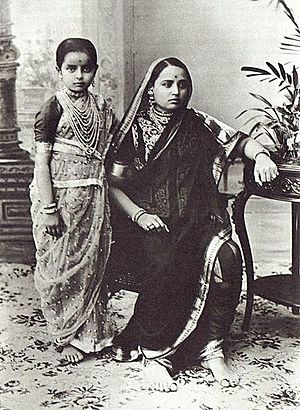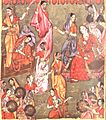Sari facts for kids
A sari (also spelled saree or shari) is a beautiful and traditional piece of clothing for women. It comes from the Indian subcontinent, which includes countries like India, Pakistan, Bangladesh, and Nepal. A sari is a long piece of fabric, like a big scarf, that is usually wrapped around the waist. One end is then draped over the shoulder. This often leaves the middle part of the body (the midriff) uncovered.
Saris are very long, usually between 4.5 and 8 meters (about 15 to 26 feet) in length. They are also quite wide, from 60 to 120 centimeters (about 2 to 4 feet). Women wear a fitted top called a choli and a skirt underneath called a petticoat with their sari. The sari is a very important symbol of culture in the Indian subcontinent today.
Contents
What is a Sari?
The sari is a special type of garment that has been worn for many centuries. It is not sewn into a specific shape like a dress. Instead, it is a single, long piece of cloth. This cloth is skillfully wrapped around the body in different ways.
How a Sari is Worn
The most common way to wear a sari is called the Nivi style. This style first came from the Deccan region in India. To wear a sari in the Nivi style:
- First, a woman puts on a short, fitted top called a choli. This top is like a blouse.
- Next, she wears a simple skirt called a petticoat (also known as parkar or ul-pavadai).
- Then, the long sari fabric is wrapped around her waist.
- Finally, one end of the sari is draped over her shoulder. This creates a graceful and elegant look.
Different Sari Styles
There are many ways to drape a sari. Each style can show where a person is from or what occasion they are dressing for. Some styles are simple for everyday wear. Others are very fancy for weddings or festivals. The way a sari is draped can also depend on local traditions.
The Sari in Culture
The sari is more than just clothing. It is a strong symbol of culture and tradition in the Indian subcontinent. It is worn by women of all ages. You can see saris at family gatherings, religious ceremonies, and national events.
Sari as a Cultural Icon
In modern times, the sari is still very popular. It shows the rich history and art of the region. Many famous people, like Prime Minister Sheikh Hasina of Bangladesh, wear saris. This shows how important the sari is in their culture.
Sari for Special Occasions
Saris are often worn for special events. For example, during the festival of Teej in Nepal, women wear colorful saris. Brides in Bangladesh often wear beautiful, traditional saris for their weddings. These special saris can have detailed designs and embroidery.
Sari in Daily Life
While some saris are for special events, many are worn every day. For example, the Tant sari from Bangladesh is often worn daily. Hotel staff in India might wear saris as part of their uniform. This shows how versatile and common the sari is.
Images for kids
-
1928 illustration of different styles of sari, gagra choli & shalwar kameez worn by women in India.
-
Prime Minister of Bangladesh Sheikh Hasina in an Ivory gold Jamdani sari
-
Aishwarya Rai in a sari at the London premiere of her film Raavan.
-
Tant sari for daily wear in Bangladesh
-
Jamdani sari of Bangladesh.
-
Galaxy of Musicians by Raja Ravi Varma depicting women in various styles of sari.
-
Education Minister of Bangladesh Dr.Dipu Moni wearing sari with Hillary Clinton
-
Bangladeshi Prime Minister Sheikh Hasina in a Rajshahi silk sari at the Moscow Kremlin in 2013
See also
 In Spanish: Sari para niños
In Spanish: Sari para niños
 | Kyle Baker |
 | Joseph Yoakum |
 | Laura Wheeler Waring |
 | Henry Ossawa Tanner |
















































